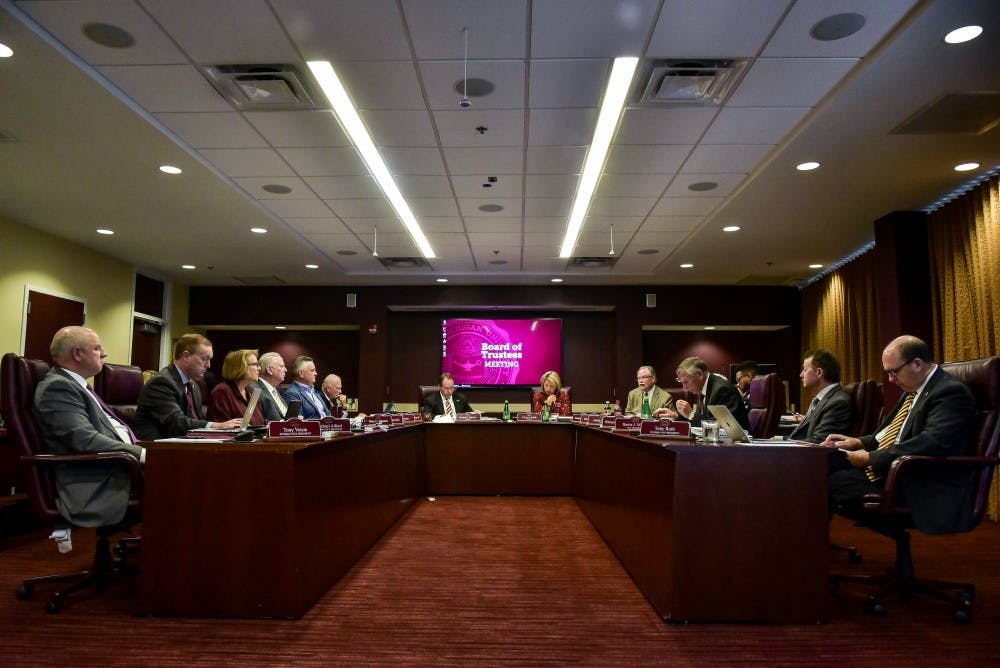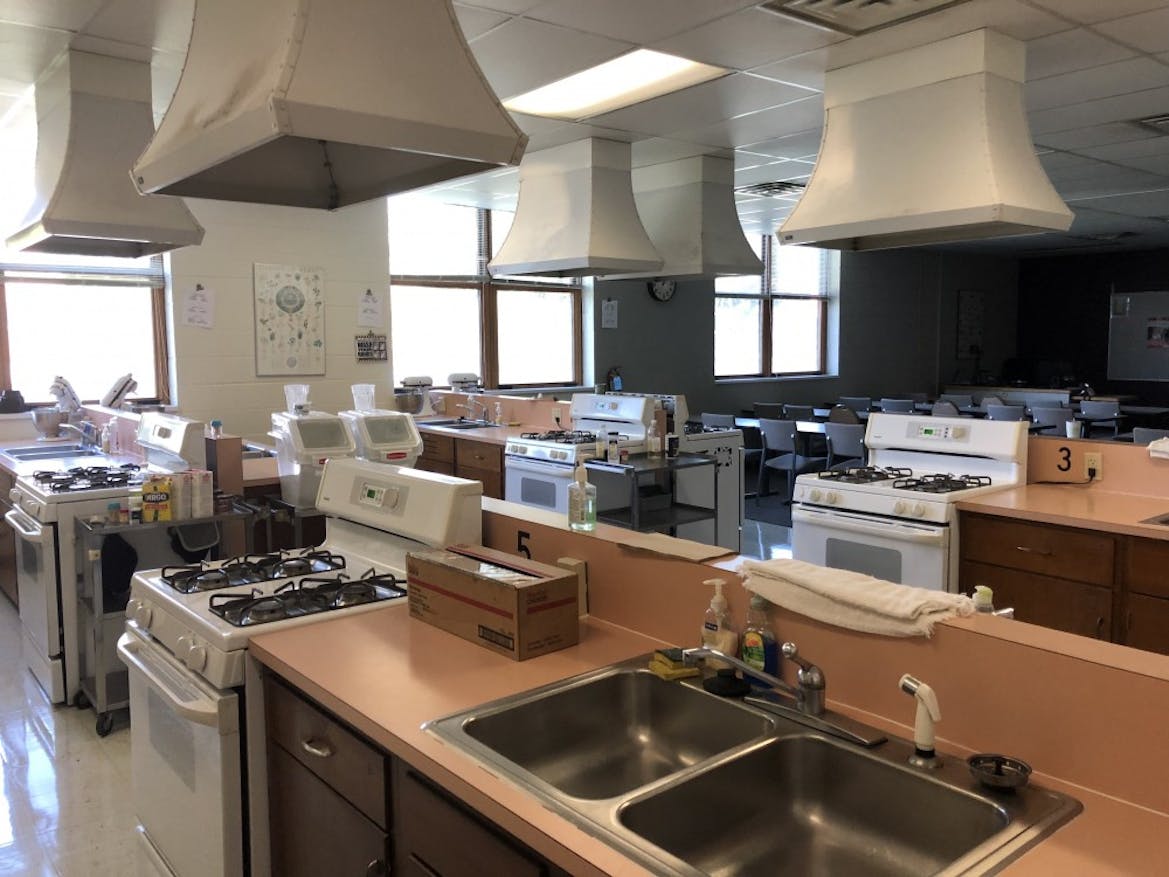Trustees approve $1M Culinary Center, discuss declined retention rates

CMU's Board of Trustees meets Sept. 19 in the President's Conference at the Bovee University Center.
Central Michigan University's Nutrition and Dietetics program will soon be getting a brand new, state-of-the-art cooking and learning facility.
The Board of Trustees approved the construction of a $1,150,000 Culinary Nutrition Center Sept. 19, which will replace a currently outdated food laboratory in Wightman Hall.
The facility will be paid for by gifts, grants and university reserves. The Nutrition and Dietetics program has already raised $664,000 through grants and alumni donations, and CMU has committed $100,000 to the project.
Jeffrey Fisher, nutrition and dietetics faculty, said Thursday's stamp of approval by trustees was the culmination of three years of hard work by the department to get the facility renovated.
"I’ve been working very hard on this project for three years, I kind of have spearheaded the efforts on behalf of our department," said Fisher, who has worked at CMU for five years. "This renovation will be a huge benefit to our students."

The Culinary Center, previously called the Foods Lab, used by the Nutrition and Dietetics program on Sept. 19, 2019 in Wightman Hall.
The old food laboratory, which was used by students to prepare for careers in the food industry, was in dire need of being updated, Fisher said. With the new renovation, students will gain exposure to new kinds of technology and equipment.
The renovated facility, which was first introduced to the board in summer committee meetings, will include equipment such as convection ovens, a blast chiller and a new video and audio system to assist faculty with instruction.
Designed with sustainability in mind, the new Culinary Nutrition Center will increase the facility’s previous capacity of 16 students to 24, according to a press release.
CMU's Nutrition and Dietetics program currently has 150 enrolled students and supports a variety of other academic programs. President Bob Davies said the program has grown in previous years, and will also appeal to CMU's adult learner market.
Five courses will be held in the new center, including Introduction to Foods, Catering for Food Service Events, and Techniques for Institutional Food Preparation.
"I think it's going to be a fantastic space," said Provost Mary Schutten. "The work stations will be changed so it's going to make better use of the space and allow it to work as a better-functioning kitchen."
Construction of the Culinary Nutrition Center will take place in Summer 2020, with classes planned to begin in the new laboratory in Fall 2020.
Decreased retention rates
After just completing his first full year at the helm of the university, Davies presented his year-end report to the board about the university's priorities for the upcoming year.
Davies outlined some areas where the university needs to approve, beginning with student retention. Last year, he said, the student retention rate dropped by four percentage points.
While it isn't uncommon for students to drop out for academic or financial reasons, administrators did see a spike in students dropping out for a particular reason: Social problems.
"Where we saw the biggest increase last year is for social reasons, such as homesickness, health challenges, family support, etc.," Davies told Central Michigan Life. "So the question is, how do we, as a university, address that? Do we need to take a look at Impact or Leadership Safari? How do we look at the Care Reports reporting system? We saw last year a much steeper spike in Care Reports coming in last year."
However, Davies explained last year's drop in retention rates hasn't been a trend; the year prior to that, there was a 2 percent increase in retention rates. Administrators plan to take a look at what happened last year and see where the university can improve.
Davies also explained that the number of students taking 30 credit hours in their first year also dropped, from 75 percent to 70 percent.
CMU also saw the average number of credit hours that students graduated with last year increase by three credit hours. Last year, the average CMU student graduated with 136 credit hours.
"We need to get that much closer to 120 to save students time and money," Davies said.
As he looks toward where CMU will be in 2030, Davies shared his top three priorities: Enrollment, enrollment and enrollment.
The president urged the university to re-envision its priorities to remain rigorous and relevant.
"Are we solely in the business of giving out degrees, or are we in the business of the dissemination, application and creation of knowledge?" he said. "In the year 2030, what type of university should we be? Who are we serving?"
Admissions application fees
Trustees also modified the university's admissions application fees on Thursday. The change was made to streamline the various rates that were charged to students, as main campus and global campus application fees previously varied.
Undergraduate admissions applications will now cost $40, and graduate admissions will cost prospective students $50. The president will be able to adjust these fees as they see fit, according to the meeting agenda.
The purpose of the application fee is to offset the cost of processing applications for admission to the university. Application fees at other Michigan public universities range from $25-100.
Addressing the gender pay gap
Chief Diversity Officer A.T. Miller presented the university's ongoing diversity, equity and inclusion efforts to the board. He announced a $300,000 grant that was approved for CMU, called the "Advance Catalyst Award," which the university will use to study and address salary gaps between male and female faculty.
He explained that in some of CMU's seven academic colleges, women are paid less on average than their male colleagues. In the College of Science and Engineering, for example, female faculty are paid 85 percent of what male faculty are paid on average.
"We're trying to address this through data-driven action, not just doing what sounds good to do," Miller said. "We found this data, and now we're doing something about it."






